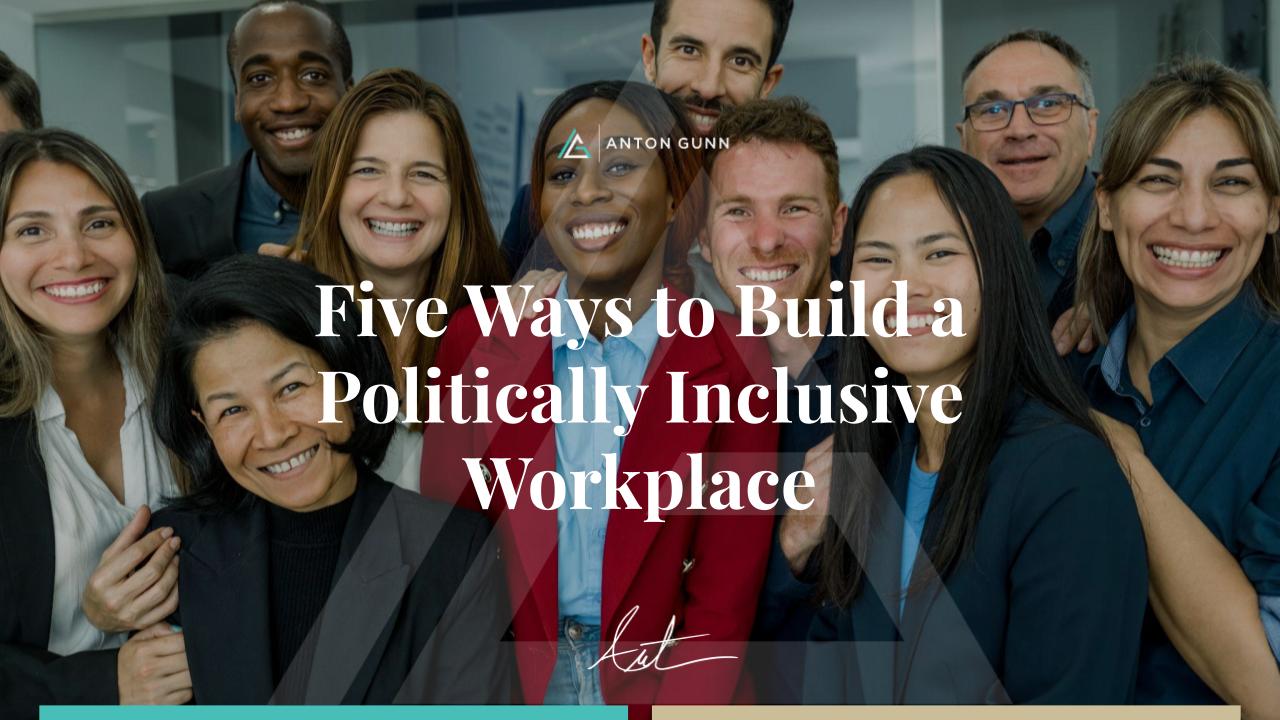In today’s hyper-partisan political climate, especially amid the heated 2024 Presidential election cycle, creating a workplace where diverse political beliefs are respected has become more challenging yet essential. The intense rhetoric, high-stakes issues, and widespread social media influence this cycle have amplified political tensions, making it harder for HR executives to navigate workplace dynamics. A politically inclusive workplace values diverse perspectives and encourages respectful dialogue, ensuring that despite external pressures, the work environment remains harmonious and productive. Creating an inclusive environment could truly make your organization a great place to work for all people. Here’s how you can create such an environment:
1. Implement Policies that Encourage Inclusivity
The foundation of a politically inclusive workplace is clear policies that promote respect and inclusivity. Develop guidelines that explicitly prohibit discrimination and harassment based on political beliefs. Ensure these policies are well-communicated to all employees and are integrated into the company’s code of conduct.
Key Steps:
- Draft Clear Policies: Outline what constitutes respectful and disrespectful behavior in political discussions.
- Communicate Regularly: Regularly remind employees about these policies through emails, meetings, and training sessions.
- Enforce Consistently: Ensure that policies are enforced fairly and consistently, without showing favoritism to any particular political view.
“A respectful workplace is one where diversity of thought is valued and everyone feels safe to express their ideas without fear of backlash.”
2. Training Programs for Cultural Competence
Training programs are crucial for educating employees about cultural competence and the importance of inclusivity. These programs should focus on helping employees understand different perspectives and the impact of political diversity on workplace dynamics.
Training Focus:
- Cultural Competence: Teach employees how to interact respectfully with colleagues who have different political views.
- Conflict Resolution: Provide tools and strategies for resolving political disagreements amicably.
- Empathy Building: Encourage employees to understand and empathize with different political perspectives.
3. Facilitate Open and Respectful Dialogue
Encouraging open and respectful dialogue is crucial for addressing political tensions. Leaders should create opportunities for employees to discuss their views in a controlled and respectful environment.
Strategies for Facilitating Dialogue:
- Host Forums: Organize forums or roundtable discussions where employees can express their views respectfully.
- Set Ground Rules: Establish ground rules for discussions, such as no personal attacks and allowing everyone to speak.
- Use Mediators: Involve trained mediators to facilitate discussions and ensure they remain productive and respectful.
4. Celebrate Diverse Perspectives
Actively celebrate the diversity of political thought within your organization. Recognize and appreciate the contributions of employees with different viewpoints. This not only promotes inclusivity but also enriches the workplace with a broader range of ideas and solutions.
Ways to Celebrate:
- Highlight Diverse Opinions: Feature stories or interviews with employees who have different political views in company newsletters or intranet.
- Diverse Panels: Organize panel discussions with speakers from various political backgrounds.
- Recognition Programs: Recognize employees who exemplify respectful political dialogue and inclusivity.
5. Promote Resilience and Well-being
Introducing stress management initiatives can help employees develop coping mechanisms to deal with political tension. These initiatives can include workshops, seminars, and regular wellness activities.
Initiatives to Promote Well-being:
- Stress Management Workshops: Conduct workshops that teach stress reduction techniques such as mindfulness, meditation, and deep breathing exercises.
- Regular Wellness Activities: Organize wellness activities like yoga classes, fitness challenges, and mental health days to promote overall well-being.
- Employee Resource Groups: Create employee resource groups (ERGs) that focus on mental health and well-being, providing peer support and a sense of community.
Conclusion
Incorporating these strategies will not only reduce political tensions but also enhance overall workplace culture, leading to higher employee satisfaction and better organizational performance. Leaders who prioritize inclusivity and respect will build stronger, more resilient teams capable of navigating the complexities of today’s political landscape.
By fostering an environment where all voices are heard and respected, you can inspire your team to work together harmoniously, regardless of political differences. Embrace these strategies and watch your workplace transform into a hub of collaboration, respect, and innovation.
What are your thoughts? Share your experiences and tips for addressing these issues in your workplace? Let’s keep the conversation going and create a future where all voices can be heard. If you’re looking for a speaker to inspire and guide your organization toward a healthier company culture, consider booking me for your next event. Also, don’t forget to connect with me on LinkedIn.







